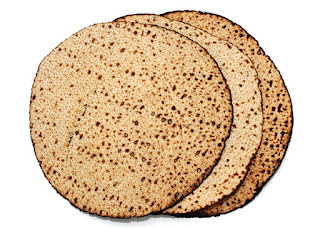Parashat Tazria (Shabbat Rosh Chodesh - Shabbat Hachodesh)
Nisan 1, 5782 / April 1-2, 2022
Torah Reading: Leviticus 12:1 - 13:59
Seventh Aliyah (Shabbat Rosh Chodesh): Numbers 28:9-15
Maftir (Shabbat Hachodesh): Exodus 12:1 - 20
Haftarah (Shabbat Hachodesh): Ezekiel 45:16 - 46:18 (Ashkenazim); 45:18 - 46:15 (Sephardim)
--------------------------------------
Community Second Seder! In Person! (And virtual). And Seder Meals To-Go! For more info, go to:
https://bnaihayim.org/passover/
-------------------------------------------------------------------
PESACH IS COMING!
My 5782 Pesach Resources - Pandemic Edition #2 is available at:
https://rav-rich.blogspot.com/2022/03/pesach-resources-5782-pandemic-edition-2.html
-------------------------------------------------------
This d'var torah is offered in memory of my father-in-law, Abraham Kronzek, whose yahrzeit falls on this Shabbat, Nisan 1. Y'hi zikhro barukh - his memory is a blessing.
This d'var torah is offered for a refuah shleimah for Feigel bat Kreina and D'vorah bat Feigel.
Check out our wonderful community, and get lots of info about becoming a Chaver and our various programs, at: https://bnaihayim.org/
Lunch and Learn meets Tuesdays at 12:30 PM on Zoom and Facebook Live. We’re continuing to read and discuss the Midrashic collection Ein Ya’akov. On April 5, we'll be at pages 25-26 (my pagination) of Chapter 5 of BT Berakhot (34b) - "...אמר רבי חייא בר אבא אמר רבי יוחנן" - "R. Chiya b. Abba in the name of R. Jochanan said:...” The reading may be found at:
https://drive.google.com/file/d/18naYXIfd37WqagfJ5UfJoH84amqt2-tA/view?usp=sharing
Rabbi Van Leeuwen has a blog which you should read at:
https://rebjasonblog.wordpress.com/blog/
Dr. Steve Pearlman writes up the "Midrashim of the Week", which you can read here:
https://rebjasonblog.wordpress.com/blog/
Dr. Steve Pearlman writes up the "Midrashim of the Week", which you can read here:
https://midrashsrp.wordpress.com/2022/03/28/tazria/
Please feel free to pass this on to a friend, and please cite the source.
-----------------------------------------------------------------------
CHARITY DELIVERS FROM DEATH
“And the person with tzara’at, in whom there is affliction, his clothes shall be torn, his hair shall go uncut, and he shall cover over his lips; and ‘Contaminated! Contaminated!’ he will call out. All the days the affliction is in him, he will be contaminated, he is contaminated; he will dwell in isolation, his dwelling will be outside the camp.” Leviticus 13:45-46
This week’s parashah, Tazria, along with next week's, Metzora, together describe a disease called “tzara’at”, which is usually but incorrectly translated as “leprosy”. These readings, along with rabbinic tradition, indicate that disease was often regarded as coming from God - as a test or as punishment. This would imply that trying to cure people would be interfering with God’s will. This is the attitude taken by, for example, many Christian Scientists, who rely on prayer rather than doctors.
But the Jewish response is different. The Torah teaches that the “metzora” (the "leprous" person, who the Rabbis say is guilty of being a “motzi shem ra” – the one who brings forth a bad name, i.e., slander) can indeed be cured – if the sick person follows the instructions of the Torah and the presiding priest, including identifying himself as guilty of the sins of slander and/or gossip. The Torah says elsewhere, “… you shall surely heal him.” (Exodus 21:19) This, our rabbis say, gives permission for doctors to practice medicine - even though we've just said above that disease "comes from God". The verse further teaches that we have a positive obligation to care for our health – and the health of others – particularly when it is a matter of life or death. This idea is called “pikuach nefesh” – literally, saving a soul. Here, the metzora is saving his/her own soul.
There’s an interesting passage indirectly about pikuach nefesh in the Talmud at BT Shabbat 156b. In a discussion about astrology, both Rabbi Akiva and Samuel (another rabbi of a preceding generation) share stories and teach that “charity (tzedakah) delivers from death” (quoting Proverbs 10:2 and 11:4). The initial teaching seems to be that the subjects of the stories were saved from astrologically predicted deaths because they gave charity to others. But a deeper reading shows that their charity resulted in saving the lives of the recipients of their charity.
I was reminded of this once when I was donating platelets at the blood bank. For about a year, every time I had donated, I had seen the same man, also a donor. He appeared to be homeless, or at least quite poor. In our conversation, he said that he donates every two weeks, the maximum allowed. He does not do it for money – that is prohibited by law. He does it, he said, because a woman in Baltimore, who needs platelet transfusions to live, is a perfect match for his platelets. “How could I not do this?” he told me.
Clearly, his charity is delivering another human being from death. And if it does nothing to raise him out of poverty, it is delivering his soul to the highest possible elevation. When we donate to charity, whether it's blood or money or food, we save the lives of others and our own souls.
Shabbat Shalom! Chodesh Tov!
Rabbi Richard A. Flom
Temple B'nai Hayim/Congregation Beth Meier
Blogging at: http://rav-rich.blogspot.com/
Visit me on Facebook
"שתיקה כהודאה דמיא"
"Silence in the face of wrongdoing is consent.”
BT Yevamot 88a
----------------------------------------
Cyber Torah list management (no salesman will call!):
To subscribe to Cyber Torah, send an e-mail with the subject heading “Subscribe Cyber Torah” to: ravflom@sbcglobal.net
Send requests for dedications of Cyber Torah in honor of a simchah, in memory of a loved one or for a refuah shleimah to: ravflom@sbcglobal.net
To unsubscribe from Cyber Torah, send an e-mail with the subject heading “Unsubscribe Cyber Torah” to: ravflom@sbcglobal.net








